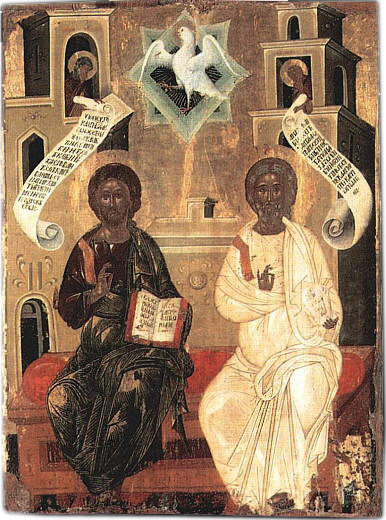|
Hypostasis (philosophy)
Hypostasis (Greek: ὑπόστασις, ''hypóstasis'') is the underlying state or underlying substance and is the fundamental reality that supports all else. In Neoplatonism the hypostasis of the soul, the intellect (''nous'') and "the one" was addressed by Plotinus. In Christian theology, the Holy Trinity consists of three hypostases: Hypostasis of the Father, Hypostasis of the Son, and Hypostasis of the Holy Spirit. Ancient Greek philosophy Pseudo-Aristotle used hypostasis in the sense of material substance. Neoplatonists argue that beneath the surface phenomena that present themselves to our senses are three higher spiritual principles, or hypostases, each one more sublime than the preceding. For Plotinus, these are the Soul, the Intellect, and the One.''Neoplatonism (Ancient Philosophies)'' by Pauliina Remes (2008), University of California Press , pp. 48–52. Christian theology The term hypostasis has a particular significance in Christian theology, particularly in Ch ... [...More Info...] [...Related Items...] OR: [Wikipedia] [Google] [Baidu] |
Ancient Greek
Ancient Greek includes the forms of the Greek language used in ancient Greece and the ancient world from around 1500 BC to 300 BC. It is often roughly divided into the following periods: Mycenaean Greek (), Dark Ages (), the Archaic period (), and the Classical period (). Ancient Greek was the language of Homer and of fifth-century Athenian historians, playwrights, and philosophers. It has contributed many words to English vocabulary and has been a standard subject of study in educational institutions of the Western world since the Renaissance. This article primarily contains information about the Epic and Classical periods of the language. From the Hellenistic period (), Ancient Greek was followed by Koine Greek, which is regarded as a separate historical stage, although its earliest form closely resembles Attic Greek and its latest form approaches Medieval Greek. There were several regional dialects of Ancient Greek, of which Attic Greek developed into Koine. Dia ... [...More Info...] [...Related Items...] OR: [Wikipedia] [Google] [Baidu] |
Henology
Henology () refers to the philosophical account or discourse on The One that appears most notably in the philosophy of Plotinus. Reiner Schürmann describes it as a "metaphysics of radical transcendence" that extends beyond being and intellection. Areas of inquiry Henology stands in contradistinction to several other philosophical disciplines. The term ''henology'' refers to the discipline that centers around The One, as in the philosophies of Plato and Plotinus. It is sometimes used in contradistinction to disciplines that treat being as their starting point (as in Aristotle and Avicenna), and also to those that seek to understand knowledge and truth (as in Kant and Descartes). See also * Absolute (philosophy) * Deleuzian metaphysics * "The One is not" in the metaphysics of Alan Badiou's work Being and Event * Giovanni Pico della Mirandola * "God above God" in the philosophy of Paul Tillich * Henosis, union with what is fundamental in reality * Monad (philosophy) * Monism ... [...More Info...] [...Related Items...] OR: [Wikipedia] [Google] [Baidu] |
Nicene Creed
The original Nicene Creed (; grc-gre, Σύμβολον τῆς Νικαίας; la, Symbolum Nicaenum) was first adopted at the First Council of Nicaea in 325. In 381, it was amended at the First Council of Constantinople. The amended form is also referred to as the Nicene Creed, or the Niceno-Constantinopolitan Creed for disambiguation. The Nicene Creed is the defining statement of belief of Nicene or mainstream Christianity and in those Christian denominations that adhere to it. The Nicene Creed is part of the profession of faith required of those undertaking important functions within the Orthodox and Catholic Churches. Nicene Christianity regards Jesus as divine and "begotten of the Father". Various non-Nicene doctrines, beliefs, and creeds have been formed since the fourth century, all of which are considered heresies by adherents of Nicene Christianity. In Western Christianity, the Nicene Creed is in use alongside the less widespread Apostles' Creed. In musical setting ... [...More Info...] [...Related Items...] OR: [Wikipedia] [Google] [Baidu] |
